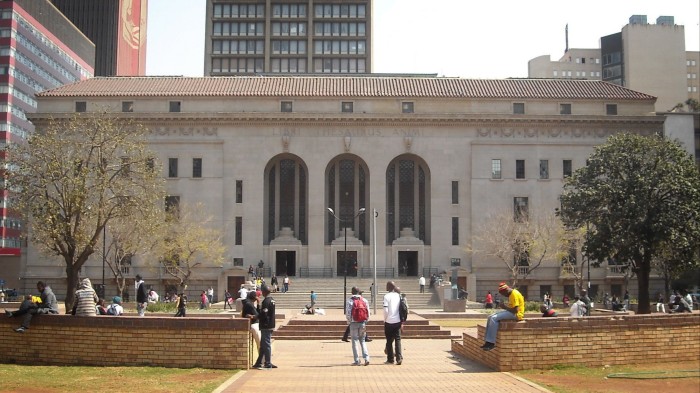Johannesburg’s officials are coming under mounting pressure to finally reopen the city’s main public library after four years, in a battle that many residents say epitomises the decline of South Africa’s economic hub.
The building, a neo-renaissance masterpiece that was once a refuge for the city’s children and unemployed workers, closed during the pandemic. Despite numerous pledges of restoration, officials claim it poses a fire risk and, for now, must remain shut.
Many in Johannesburg see the continued closure as being emblematic of the fate of a city that has cycled through 10 mayors in six years, none of whom could fix frequent water shortages, power blackouts or potholed roads.
“The library’s closure is a metaphor for how badly the city has been run,” said Flo Bird, a resident of the city who has been at the centre of a movement to ensure the imposing 89-year-old five-storey landmark reopens.
Amogelang Kgoathe, the project manager overseeing ensuring the library meets fire regulations, said the city was moving as fast as possible.
“There will be a partial reopening in February, with the rest being opened by June or July,” she told the Financial Times.
Earlier this year, dozens of residents held a protest outside the library to demand the institution, which contains 1.5mn books detailing the country’s history before and during Apartheid, does not permanently remain shut.
“The library houses one of the greatest repositories of Afrikana on the continent, as well as documents you won’t find anywhere else,” says Kathy Munro, a retired professor from Wits University. “Yes, there are now branch libraries in the suburbs, but this is the one true city library, servicing the thousands of people who came from all over Africa to live in Johannesburg.”
For some, the struggle to revive the library underscores how economic priorities have shifted in the post-Apartheid era — a trend that is most noticeable in a city that used to dominate the global gold mining industry and still contributes 15 per cent of South Africa’s GDP.
“We’ve seen a collapse in basic administration and governance in Johannesburg, along with political instability, and the library is a casualty of that,” said Yunus Chamda, part of the Joburg Crisis Alliance, made up of a number of civil society groups.
First opened in 1935 and built by John Perry, an architect who won a national competition to design it, the library’s 140 internet-enabled computer stations had helped the 650,000 people who live in the inner city — many immigrants from Zimbabwe and Mozambique — find work.
“I met people there who used that library to get their university degree by correspondence. And the librarians helped children from some of the really poor inner-city schools with their school projects. For those people, this has been heartbreaking,” said Bird.
City officials, however, are under increased scrutiny over meeting safety requirements after a deadly fire broke out in a nearby hijacked building in the inner city in August 2023, killing 77 people.
At a meeting in mid-November at the Johannesburg Development Agency, the city arm in charge of the project, Kgoathe said there were many reasons why the reopening was taking so long.
Only after it was closed during Covid did an inspection reveal leaks in the roof, water damage and the fact that it was a fire risk. The agency then had to lobby hard for state funding to fix this.
“Had it remained open while all this was going on, it would have not only been unlawful, but it risked harming those people you let in. It was more important to save lives than keep the library open,” she said.
In mid-December, the agency said the rebuilding of the library was 22 per cent complete, but had been held up by plans to install water tanks, to mitigate against the city’s erratic water supply in case of fire.
The agency said it was fast-tracking the project, as it recognised the “significant impact the library’s closure has had on students, researchers, and the broader community”.
The Democratic Alliance, the main opposition party in the city, believes the scent of corruption hangs over the library’s refurbishment.
“There is little to show for the money spent so far and it is suspicious that costs have ballooned to this extent,” Kingsol Chabalala, a DA member of the legislature of Gauteng, the province that covers Johannesburg, told the FT.
In September, Johannesburg’s government acknowledged in response to questions from the DA that the cost of rebuilding the library had soared to R77.8mn ($4.2mn) — which Kingsol said was far higher than the initial projections of R45mn.
Kgoathe defended the costs for the project as being reasonable, given that the initial estimate was made in 2021, and the city had to factor in the “escalation over time”, among other factors.
Brendan Hart, an architect working on the building, said in November that some delays came from “wanting to do things in a way that is responsible to the heritage value and significance of the building”.
But Wynand Dreyer, an engineer working with the Heritage Foundation, a civil society group pushing for the library’s reopening, said the delays were indefensible.
“This library operated just fine for decades and was relied upon by so many people who really had few other options. To shut it down like this, for four years, did so much damage to their lives,” he said.
On a summer day this month, construction workers milled about in front of the building, constructing a platform for a new water tank to deal with potential fire outages. One worker shrugged when asked if it would be open by February. “Who knows, these guys are never on time,” he said.
Read the full article here
